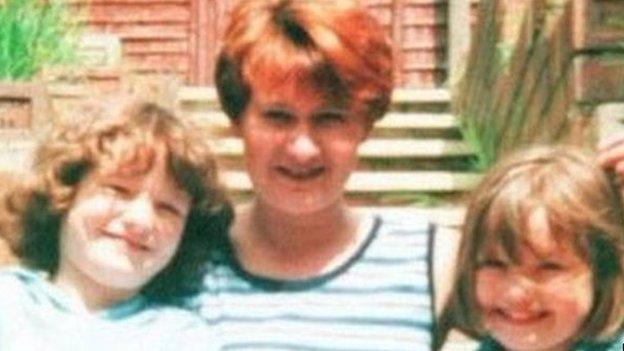Clydach murders: Potential doubts over conviction of David Morris
- Published
Prof Mike Berry casts doubt on the conviction of David Morris for Clydach murders
Fresh doubts have been cast on the conviction of the man jailed for the horrific Clydach murders in 1999.
David Morris was found guilty of murdering an entire family of four, external including two young girls.
But potential new witnesses, along with the views of experts, have given campaigners calling for his release fresh hope.
South Wales Police say Morris was convicted twice at two trials after an "extensive investigation".
Relatives of the victims say they have no doubt Morris was responsible, and say the suffering caused by the deaths still affects them.
Family wiped out
There may be disagreement over the details, but nobody disputes that an almost unspeakable crime was committed at 9 Kelvin Road in Clydach on the night of Saturday 26 into the morning of Sunday 27 June 1999.
Beginning at about midnight on the Saturday, extreme violence was unleashed on Mandy Power, her 80-year-old mother Doris and Mandy's children Katie, aged 10, and Emily, aged eight.
All four were beaten to death with a metal pole and fires were started in different parts of the house.
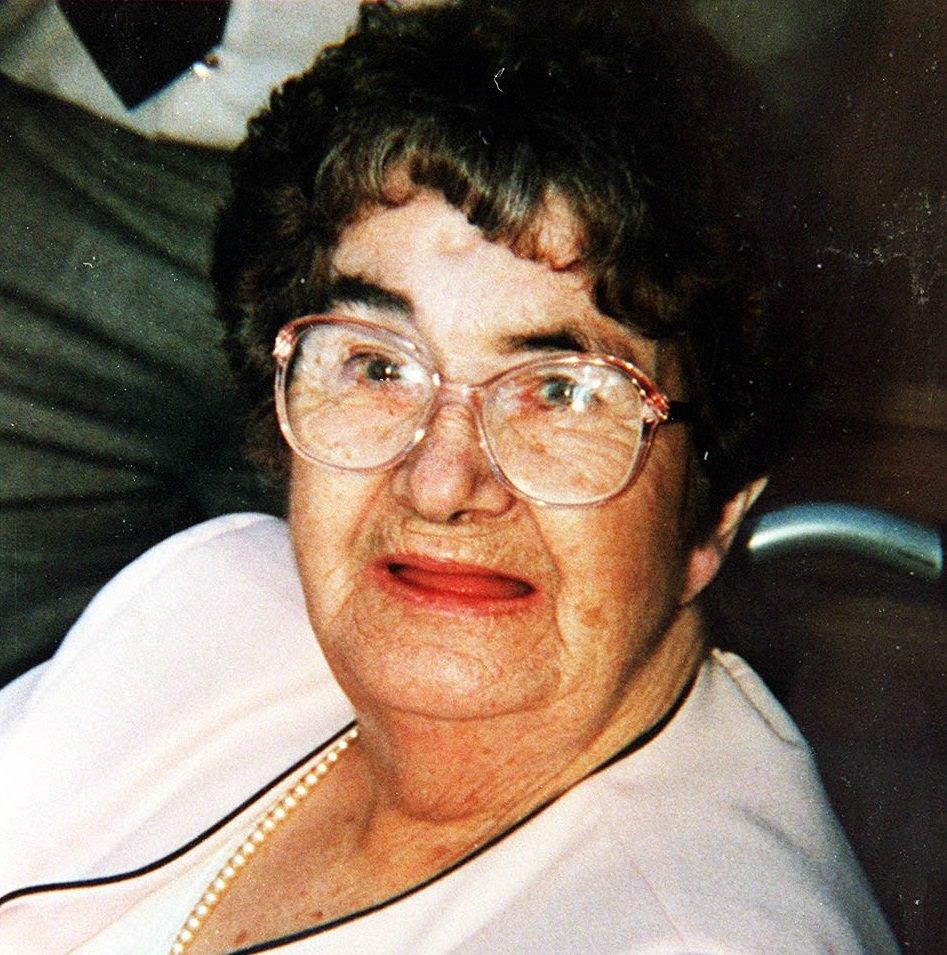
Grandmother Doris was found murdered in her bed

Neighbours called the fire service and the scene was initially dealt with as a fatal blaze before the full horror of the murders emerged.
It wasn't until August 2006 that David Morris, also known as Dai Morris, was jailed for the final, decisive time for the crimes and sentenced to life, a term that was later reduced to 32 years.
In the years between the killings and his jailing, other suspects - including serving South Wales Police officers - had been investigated and Morris was convicted and jailed only to have that sentence quashed and a fresh trial ordered. He was then found guilty by a second jury.
He has always maintained his innocence and a campaign to free him is gathering pace.
Now, BBC Wales Investigates has spoken to people who were not called to give evidence at either of his trials, along with experts who were either involved in the original investigation or have studied the case extensively.
What they said raises questions about the strength of his conviction.
Convicted Clydach murderer 'an easy target'
Lies led to trial
The campaign to quash Morris's conviction has grown in size and volume over the years but while his family remain convinced he was not capable of the crime, his own actions at the time undermined his claims of innocence.
The investigation into the murders was given fresh impetus in 2001 when an off-duty police officer overheard a conversation about Morris having had sex with Mandy.
His name had been mentioned in the weeks immediately after the killings and he had given a statement to police but had been put on the back burner. Now he was front and centre.
Morris initially withheld the fact he had been in a sexual relationship with Mandy. He also told a lie that would come back to haunt him.

Morris's family have always maintained he is innocent
In police interview he was asked if a gold chain found at 9 Kelvin Road was his. He swore it wasn't. "On the lives of my children," were his exact words.
But the chain was his, and when he finally admitted that it helped seal his fate.
Morris says he hid his fling with Mandy from police because his then girlfriend Mandy Jewell was her best friend and it would have ended their relationship.
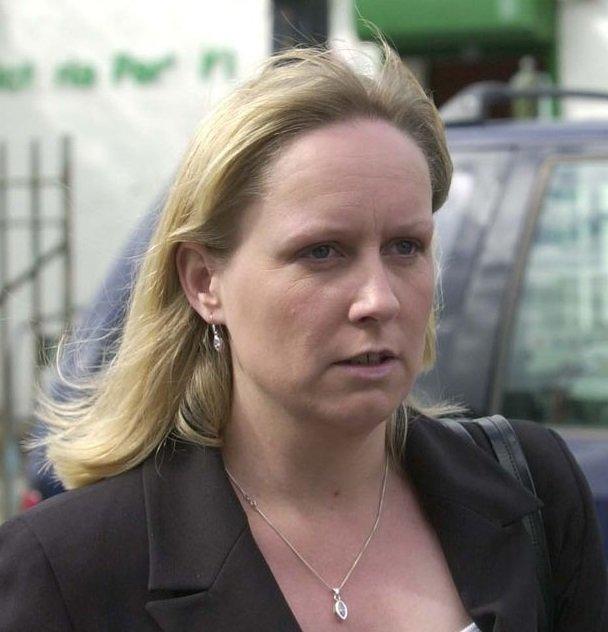
Morris said he was afraid his then girlfriend Mandy Jewell would be furious about him having sex with Mandy Power

There were also issues with his alibi. Morris had been drinking at the New Inn on the edge of Clydach and said he had wandered the streets for hours, first towards his home then towards Swansea, before eventually getting home about 03:00 when he claimed his girlfriend Mandy Jewell let him in.
Mandy initially told police Morris had arrived home between 22:30 and 23:00 and she didn't let him in, but in court said she didn't know what time he came back, but that she did let him in.
The juries were also told Morris had previous convictions for violence, and at both trials - the first in 2002 and the second in 2006 - he was found guilty of all four murders.
Suspicions over officers
But Morris wasn't the first suspect. The police had originally looked at two of their own.
Stephen Lewis, his wife Alison and his twin brother Stuart were arrested in July 2000, the married couple on suspicion of murder and Stuart on suspicion of perverting the course of justice.
Stephen's wife Alison Lewis, a former officer with South Wales Police, had been in a lesbian affair with Mandy, and suspicion had fallen on Stuart because of events on the night.
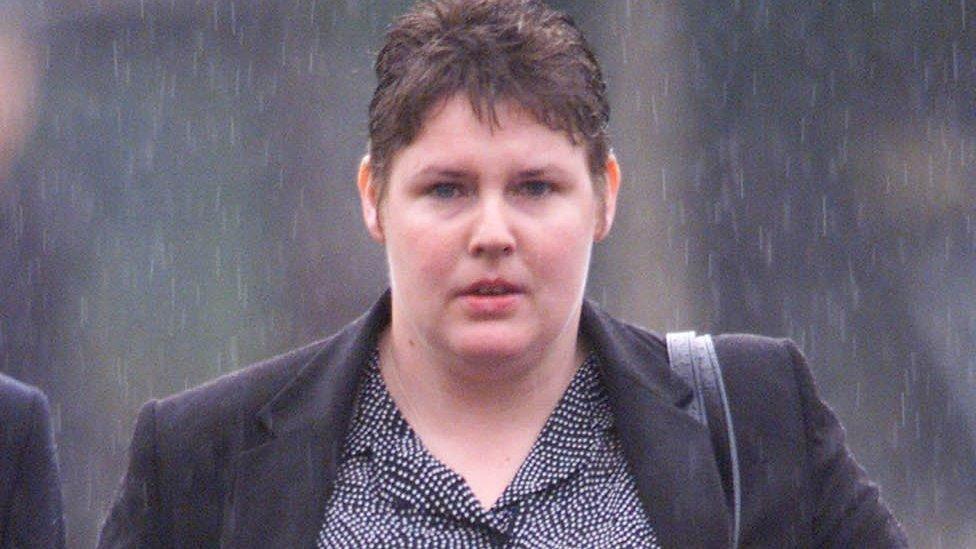
Alison Lewis and her husband Stephen were initially suspects
He was then an Acting Inspector and was not only on duty the night of the murders but was the most senior officer to arrive at the scene.
Stuart stayed at 9 Kelvin Road for less than 10 minutes, failed to preserve the scene and his log book for that night went missing. He also didn't fill in his pocket book until the Monday.
But despite the initial suspicion over the trio, it was decided there was insufficient evidence linking them to the crime and they were not charged, external, eventually being ruled out as suspects in January 2001.
There is no DNA evidence or fingerprints linking Morris to 9 Kelvin Road, and no witnesses could place him there on the night of the murders.
But speaking for the first time, a potential witness has told the BBC they saw a man or men close to the house that night.
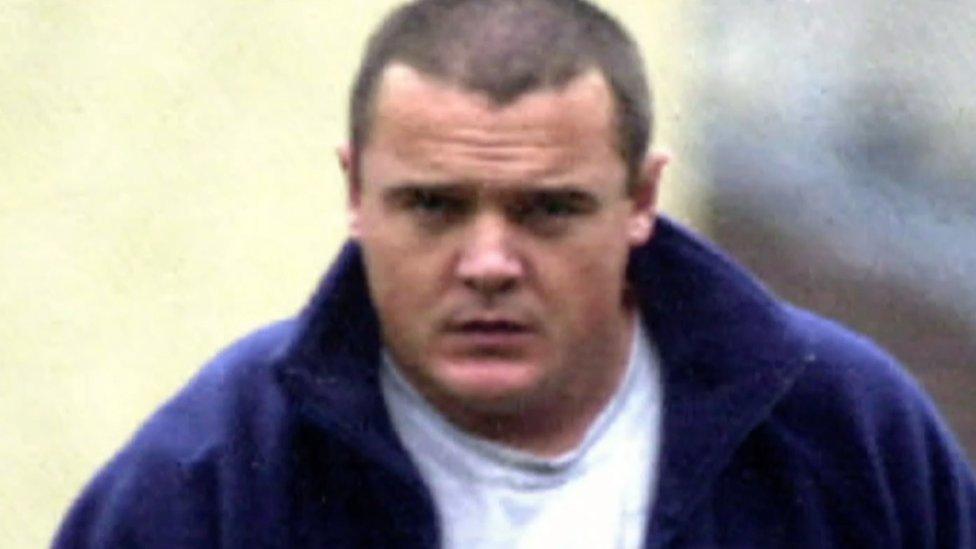
Stuart Lewis was one of the first police officers to arrive at the murder scene
Taxi driver Mike claims he was driving down Vardre Road, a short walk from Kelvin Road, between 02:00 and 02:30 when he noticed two men walking along the pavement.
"What struck me was they were very, very similar," he said. "Both had dark hair, cropped."
When he heard about the murders the next day, he says he called the police to tell them.
"They took my details and said that person dealing with it, or that team, would be in touch," the driver said. But nobody called him back.
Two weeks later the driver says he called police again to say not only had he seen the men but he could now identify them - as Stephen and Stuart Lewis.
"When their pictures appeared in the press I realised that it was them that I'd seen that morning," said the man, who maintains he is "100% convinced" it was the Lewis brothers he saw.
The taxi driver was never called to give evidence at either trial.
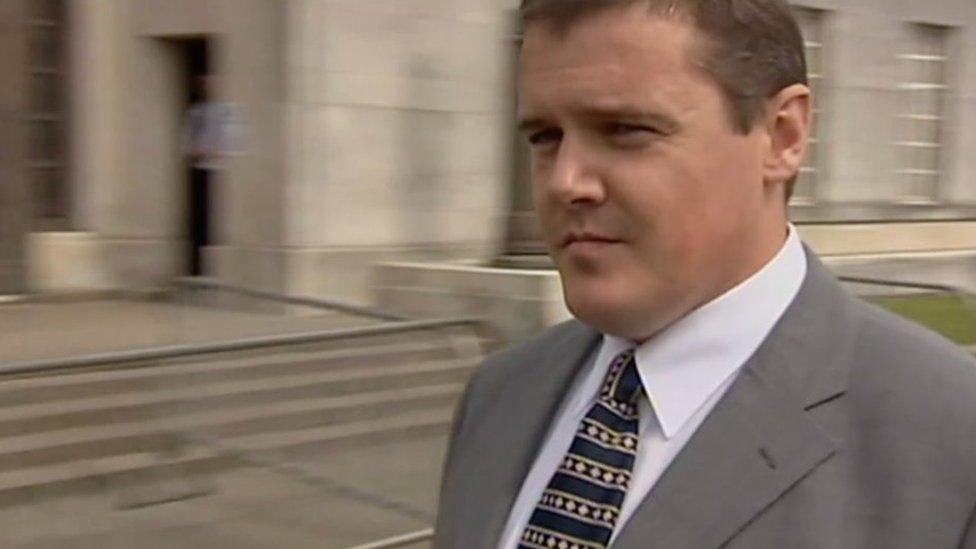
Stephen Lewis and his wife Alison were arrested but never charged in connection with the murders
On the night of the murders, Nicola Williams was driving on Gellionnen Road in the early hours of Sunday 27 June 1999, and also thinks she saw Stephen Lewis near Kelvin Road around 02:30.
Not only did Ms Williams pick Stephen out of a video identity parade, she also provided police with an e-fit. But it was never released to the public and in court the prosecution dismissed her account.
Her evidence also doesn't appear to have affected the jury's decision about David Morris' guilt.
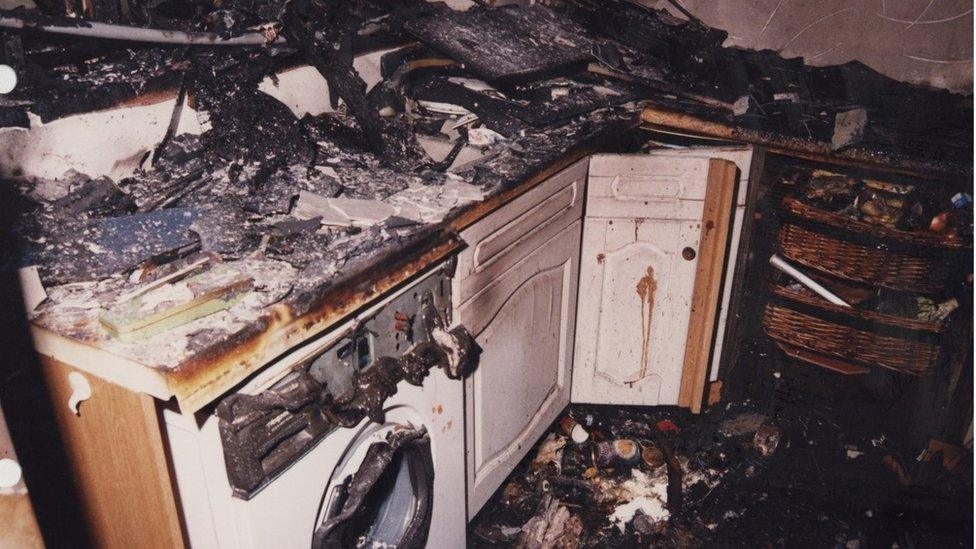
The most damaging fire in the house was started in the kitchen
Ms Williams says the man she saw was wearing a bomber jacket and carrying a rolled-up bundle under his arm - the same description another new potential witness has given the BBC.
John Allen never came forward at the time of the murders, however he now claims that he saw a man in his headlights in a bomber jacket carrying a bundle as he drove down Gellionnen Road into Clydach between 04:00 and 04:30.
He says he is sharing his story now to "get justice for the community and everybody that was involved" and has "no vendetta" against the police despite his own criminal past.
Morris's defence team say this sighting needs further investigation.
In a statement, Stephen Lewis told the BBC he had no part in the murders and that his alibi - that he was at home with his wife Alison - suggests that witnesses who suggested he was in Clydach the night of the killings were mistaken.
Alison has always maintained that she was at home with Stephen and he was beside her in bed all night.
Stuart Lewis, questioned on previous occasions, said he did not see Stephen or Alison that night.
'Impossible' for Morris
Morris may have given a muddled account of his movements the night of the murders, but more than one expert thinks the official timeline undermines his conviction.
Morris admits he drank eight pints at the New Inn, which witnesses say he left about 23:30. The prosecution said he also took amphetamines - something he denied.
From the pub it's a walk of around 15 minutes to 9 Kelvin Road, and Mandy Power and her daughters are believed to have arrived home about 23:48 after they had been babysitting.
University lecturer and journalist Brian Thornton, one of the founders of the Crime and Justice Research Centre at the University of Winchester, has studied the Clydach murders for a decade.
He says those timings, and understanding who was killed first, are critical.
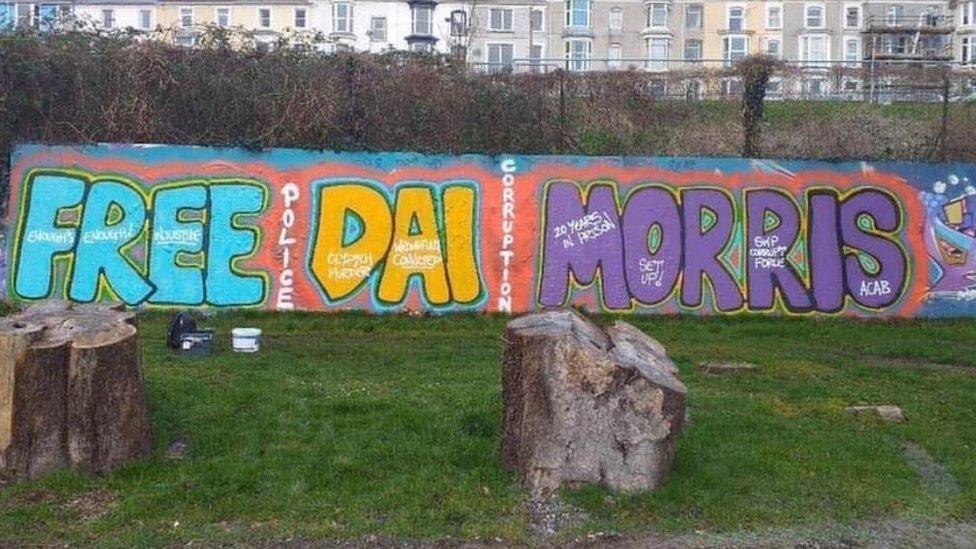
The campaign for David Morris's conviction to be overturned has gathered pace
"There are two areas that make us very confident that Doris died first," he said.
"First of all is the murder weapon."
The pole used to murder the family had traces of blood from Mandy and the two girls. However there was no blood from Doris suggesting she was killed first then later use of the bar removed traces of her.
"The second is the sequence. We know that Doris was upstairs in bed and then what the forensic scientists have worked out is that somebody has come in and for whatever reason has killed Doris in her bed.
"But in the process, the killer has smashed a light bulb which has caused at least the top floor of the house to go dark because it's been fused."
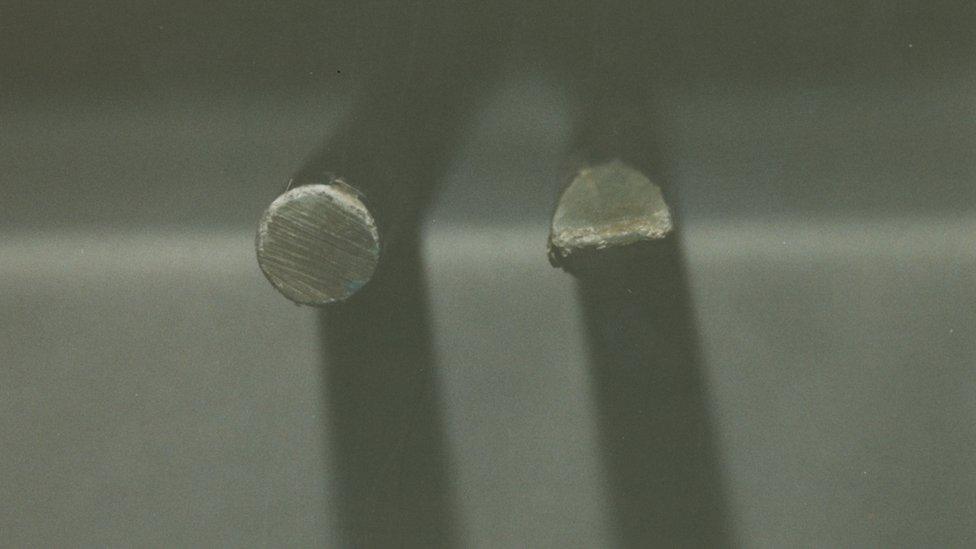
The metal pole used to kill the four victims
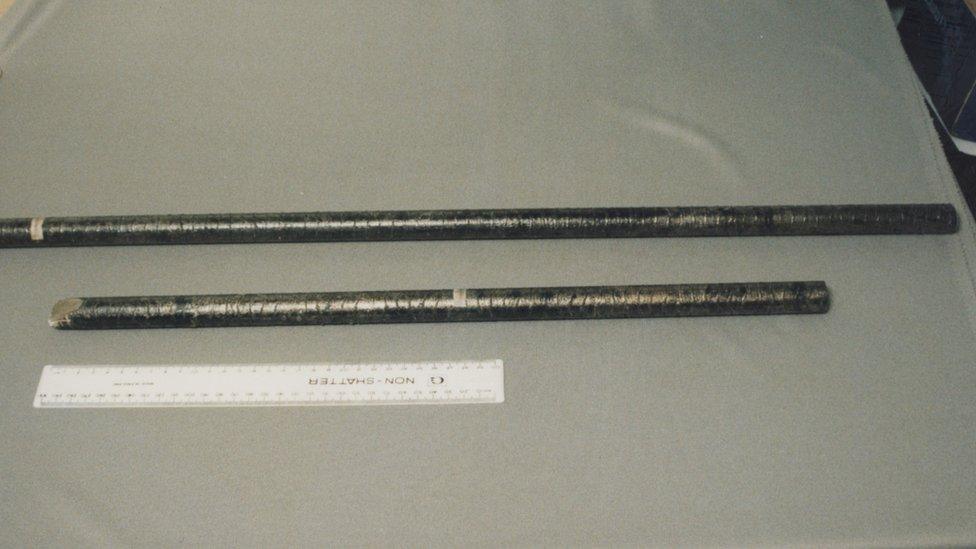
Blood found on the murder weapon led one expert to conclude it was Doris who was killed first
Mr Thornton says the evidence indicates the killer went into the children's bedroom, removed a TV from a chair and took that chair downstairs to use it to reach the fuse box in the bathroom, fixed the lights and then waited for Mandy and the two girls to come home.
The sequence of events combined with the timeline of Morris's known movements have led Mr Thornton to conclude it's "nearly impossible" for him to have carried out the murders.
"He left the pub at half past 11, Mandy and the girls came back just before 12," he said.
"It means that he [Morris] will have had to walk to Kelvin Road, kill Doris, change the fuses - he'll have had to have done all those things.
"There simply isn't enough time to do that."
Forensic scientist Clair Galbraith was one of the first people to arrive at 9 Kelvin Road the night of the killings, and it was she who found the murder weapon.
She was one of only a handful of experts to express an opinion on who was killed first - she believes it was Doris.
The timeline of the killings is another angle Morris's defence team want to explore, as it was not something used in his defence at either trial.
Killer's bizarre behaviour
Professor Mike Berry is a consultant forensic psychologist who has helped police forces in high profile killings - including the murder of Geraldine Palk in Cardiff.
He has studied the Clydach files and has raised a number of questions about the killer's behaviour and says he finds it hard to believe Morris was behind what happened afterwards.
When all four residents of the house were dead, the killer did not flee but stayed to perform bizarre acts including taking Mandy's body to the bathroom and apparently washing it.
Small fires were started in various parts of the house, the main one in the kitchen.
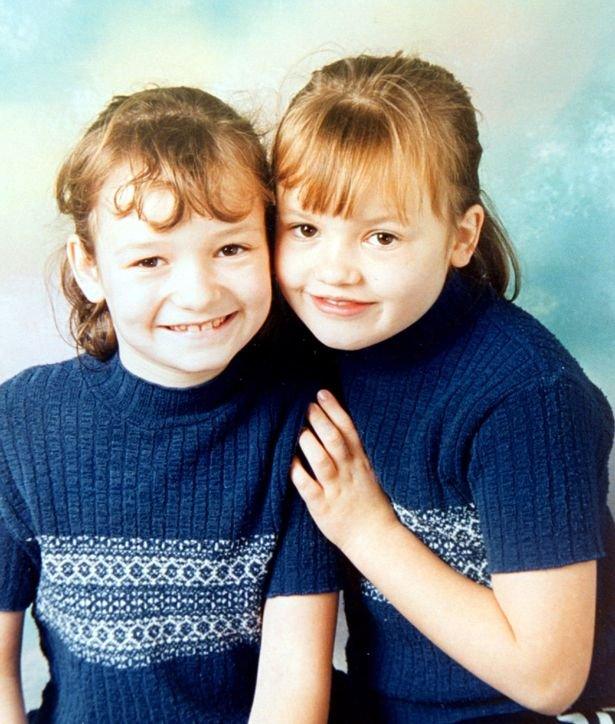
Although Emily and Katie Power were murdered, one expert says their mother was the main target

"The attack on Mandy shows that she was a target," said Prof Berry. "The girls I think, to use that awful expression, were collateral.
"I think the motive for murder here is anger. The killer clearly is angry with Mandy by the amount of violence used on her."
If Morris had drunk a considerable amount of alcohol and taken drugs, Professor Berry doubts he would have behaved as the killer did after the murders.
Prof Berry concluded there were a number of people who might have carried out the murders - and he couldn't rule out David Morris as a strong contender.
Why was evidence withheld?
The investigation into the Clydach murders was vast. Some 4,500 statements were taken and there were 4,000 exhibits.
But not all of that evidence was made available to the defence due to court orders made under Public Interest Immunity or PII.
It's a method by which the prosecution can justify the non-disclosure of material which assists the defence, and is therefore supposed to be used sparingly.
Barrister and civil liberties expert Simon McKay is concerned about the use of PII in the Clydach trials.
He said there appears to be a "significant volume of material" which was withheld using PII and he cannot see an "obvious reason" to justify it.
"When one looks at the entire context of the case… then it's understandable that one walks away with serious concerns that justice has been done," said Mr McKay.
Investigation was 'extensive'
Morris's defence team are planning to take the potential new evidence to the Criminal Cases Review Commission - the first step in getting any conviction quashed.
South Wales Police says it acknowledges the "significant impact" the case continues to have on the victims' families and the wider community. It says it carried out an extensive investigation into the murders and points out Morris was convicted twice by a jury.
A statement released this week on behalf of Mandy's family said the continued campaign for Morris's release was "very upsetting".
"Every day we live with the heartbreak of the loss of our family," it said.
"Katie and Emily were only 10 and eight when they were murdered they were never given the chance to grow up and have their own families, unlike Morris who has the privilege of seeing his children and grandchildren.
"We have always said we will fight for our family, but we never expected to be fighting 21 years on."
Speaking for the first time since the murders, Michael Power, Mandy's former husband and Katie and Emily's father, said time had not healed his pain.
"I miss my girls every day and not a day goes by that I don't think about them," he said.
"Both trials ended with the same verdict which we believe as a family was the right decision."
BBC Wales Investigates The Clydach Murders: Beyond Reasonable Doubt on Thursday, 22 October at 21:00 GMT on BBC One Wales and afterwards on iPlayer
Related topics
- Published12 July 2017
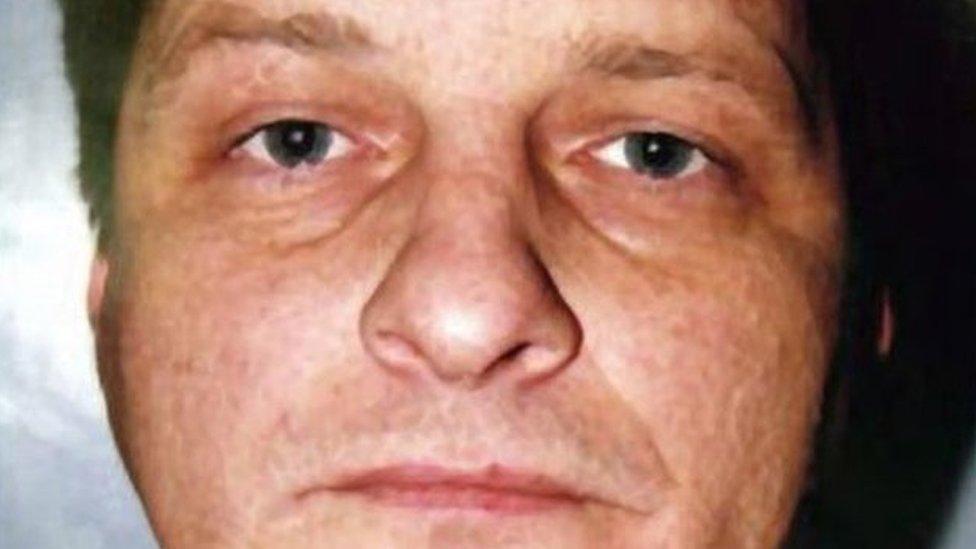
- Published21 December 2014
